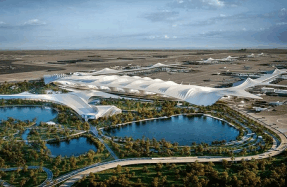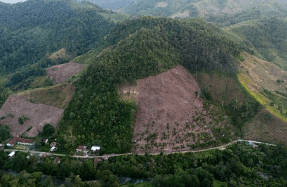An independent north? What an England severed in two might look like

It was a tweet sent in jest – but which perhaps somehow captured a growing mood across the nation. Or, rather, across the top half of it.
As leaders in Greater Manchester tussled with the government over Covid-19 restrictions in October, Sir Richard Leese – the head of the city’s council and a man known for straight talking – took to social media to air his frustration with Westminster.
“We now know what rebalancing the economy means for this government,” he wrote referring to fears that new tier three rules would decimate the regional economy. “It means tilting it south. Time for UDI [unilateral declaration of independence] in the North?”
This was, it should be made plain, a joke. But it may also have been one that fell into the category of: kidding… unless…?
Across the north, there are growing conversations not just about devolution but about a full-blown secession movement. If Edinburgh and Cardiff will one day be post-UK capitals (as seems ever more likely), so runs the argument, why not York?
Graffiti championing an independent republic has already appeared in cities including Manchester and Leeds; while frustration at the ever growing north-south divide – a gulf thrown into sharp contrast by coronavirus – has led political and business leaders here to call, if not for full nationhood, at least for greater autonomy.
“Northern voters are tired of a Whitehall bubble that doesn’t listen to their concerns and which, they feel, is too remote,” Henri Murison, director of the Northern Powerhouse Partnership, told The Independent.
Most tellingly of all perhaps, a new political party has just been founded with a single overriding aim: to win the right for a referendum on self-determination. The Northern Independence Party’s leader, Philip Proudfoot, is adamant it means business – even if it only has 230 volunteers signed up so far.
“This region is the most impoverished in northern Europe despite England being the fifth richest country in the world,” the 32-year-old anthropology lecturer says. “There has to be a fundamental redressing of the balance of power, and the only way to do that is through a radical break with the chains of London. Let me be clear, we want full national statehood.”
All of which leads to one obvious question: what colour would the new football team wear?
But there may perhaps be other points to consider too. Could a new Upper Albion actually work in reality? What would the political model be? And, most immediately, what even is the north anyway? Is Derby included?
So many questions but wonder no longer. Here’s a cut-out-and-keep guide to how a new upper republic might work…
Where would the southern border be?
As India and Pakistan will testify, if two countries don’t have a defined border you’re baking in future problems.
So it could be with a northern nation – because no one really knows where exactly the north starts. In the Orkneys, as a letter writer to The Times once noted, the south means Aberdeen down.
The NIP refers to Northumbria, which historically meant land north of the Humber – and would, therefore, include Newcastle, Liverpool, Manchester and Leeds but not, for instance, Sheffield. Yorkshire would be severed in two. Which, it’s fair to say, might not please a lot of Tykes.
“But we’re aware the north means many things to many people,” says Proudfoot. “The way we would do it with contentious border territories is be willing to put forward a candidate in an election before collectively drawing up borders.”
In a perfect scenario that might lead to a clean and legitimately accepted break. More likely, you’d be talking about a factious and highly contested binary split that risks immediate instability, while consuming political and economic energy for years to come. Sort of like Brexit.

What about the capital?
York was the historic capital of England but the village of Bamburgh – about 20 miles from the Scottish border – was the ancient seat of the old Northumbrian kingdom, so both those would stand a good shout as the prime city.
That said, Manchester and Liverpool would likely be the economic and cultural powerhouses, probably leading to talent and resources being remorselessly sucked to the northwest in much the same way it’s sucked to London today.
That could cause regional resentment and structural inequalities which, in turn, may result in other swathes of this new country – and apologies if this sounds familiar – demanding to break away from the chains of a Manchester bubble that doesn’t care about the (rest of) the north.
What are the economic prospects?
Let us be optimistic and cal them challenging.
As with Wales, if the north broke away from London, it would find itself with an instant fiscal balance sheet that economist might describe as “not ideal”.
The exact details are difficult to analyse because, as above, we still don’t have a defined territory. But, as a general rule, the north is a huge net beneficiary of the UK’s tax system. It takes from the pot far more than it puts in. Last year, the northeast, northwest and Yorkshire combined had some £42.5bn more spent there than was raised there. By contrast London raised £38bn more than was spent.
“Unless there was a credible plan for super-rapid economic growth, significant tax rises, and instantly deep cuts, a newly independent north would find it almost impossible to borrow money,” says Tom Forth, head of data at the Open Data Institute in Leeds. “It would be facing bankruptcy on day one.”
Proudfoot, nonetheless, is undeterred.
“I have absolutely no idea what a free north’s economy would look like,” he says. “But if we have full control of our economic policy the potential could be endless: free education for all, massive investment in public transport, a green industrial revolution.”

What would the foreign policy be?
Specifically, perhaps, would a new north apply to be a member of the EU? That’s to be decided, says Proudfoot.
But huge numbers in the north feel this was decided in 2016.
In places like Barnsley and Hartlepool, it’s reasonable to assume that breaking away from London only to tag up with Brussels would be about as popular as illegalising a bendy banana. “I think people up here would be banging on the door of Westminster asking for forgiveness,” says Shane Moore, the Brexit-backing leader of Hartlepool Council.
So, er, let’s call that one “open for discussion”.
Another intriguing question is would a free north have a standing army? Possibly not. While units like the Mercian Regiment are all well-renowned and well-drilled forces, they do cost money – which would, as said, be at a premium. As such, with only (presumably) friendly faces to the north, west and south, the world’s newest nation may decide to become one of the handful of countries sans military.
What colour would the sports teams wear?
The biggest question of all. Yorkshire already has a so-called national football team which plays games against de facto countries and stateless nations – and they wear light blue. But quite what a northern side would deck themselves out in remains unclear.
One thing that does seem likely is it probably wouldn’t include a badge that doffed its cap to a now foreign royal family. So a new terrace chant – “No lions on a shirt”? – would be needed.
Any other immediate policies?
The NIP’s full manifesto is still being drawn up but Proudfoot has previously said he’d like to see the Newcastle-based bakers Greggs nationalised and Dominic Cummings denied entry at the new border.
“People have asked if we’re a joke because we say [tongue-in-cheek] things like that,” he says. “But the point is that in the north we tell jokes but our policies will be serious. In Westminster they might look serious but their politics are a joke.”
There has been no discussion about heads of state or a national anthem – although “On Ilkla Moor Baht’at” is a rip-roaring old tune.
Wouldn’t the creation of a new artificial nation just balkanise one of the planet’s most stable islands?
Well, yes, of course it would.
Very few sensible observers believe the north is as prosperous as its potential shows it could and should be.
Decades of structural inequalities impacting on everything from education and job creation to culture and transport – all exacerbated by repeated governments too cowed or unconcerned to take meaningful action – have left a gaping gap between north and south. People even die younger up here.
Yet it’s hard to see how chucking up a Sykes-Picot line across an island solves that.
Probably of greater benefit would be federalised devolution, a decades-long solidarity pact-style economic plan and, just possibly, a generation of talented northerners showing the desire and courage to eschew the capital, stay in their homelands and help build future opportunities here.
Proudfoot, it’s worth saying, is originally from Durham but now lives in, er, London.
He has to be in the south for work, so he says. He is, he reckons, a symptom of the economic malaise rather than a cause of it.
Yet some might wonder if it’s rather a unsatisfactory contradiction that a man aiming to severe an island is not himself living in the half he wants severed.
Back with Henri Murison – a man based in Leeds – it is clear he shares the same sense of frustration as Proudfoot, but believes reform is the way forward.
“Devolution of real powers and funding is the only way to truly rebalance the economy and political structure of the UK,” he says. “Covid-19 has been a real case in point for our disappointing centralised system. It has proven metro mayors and local leaders need a far bigger say in how money is spent and how their communities are run.”







